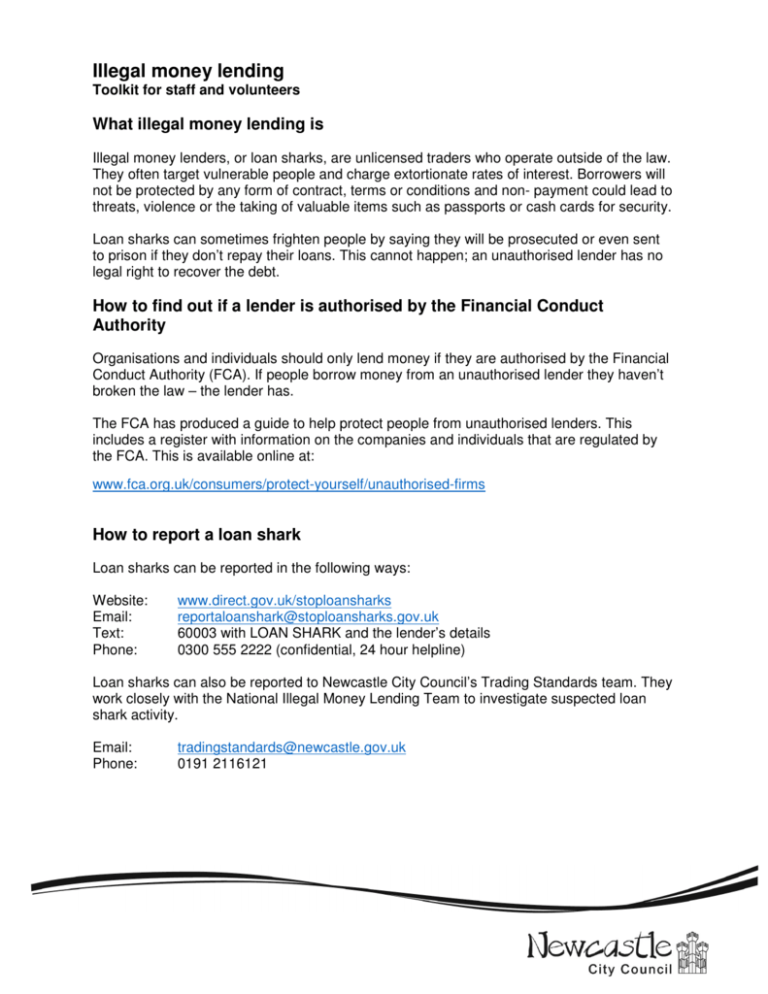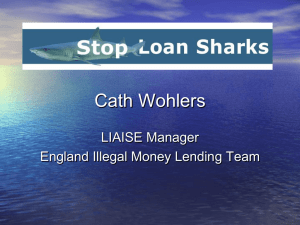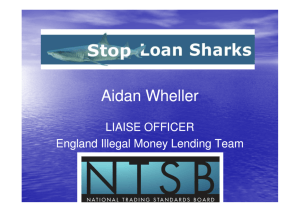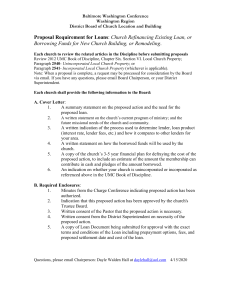Illegal money lending - Newcastle City Council
advertisement

Illegal money lending Toolkit for staff and volunteers What illegal money lending is Illegal money lenders, or loan sharks, are unlicensed traders who operate outside of the law. They often target vulnerable people and charge extortionate rates of interest. Borrowers will not be protected by any form of contract, terms or conditions and non- payment could lead to threats, violence or the taking of valuable items such as passports or cash cards for security. Loan sharks can sometimes frighten people by saying they will be prosecuted or even sent to prison if they don’t repay their loans. This cannot happen; an unauthorised lender has no legal right to recover the debt. How to find out if a lender is authorised by the Financial Conduct Authority Organisations and individuals should only lend money if they are authorised by the Financial Conduct Authority (FCA). If people borrow money from an unauthorised lender they haven’t broken the law – the lender has. The FCA has produced a guide to help protect people from unauthorised lenders. This includes a register with information on the companies and individuals that are regulated by the FCA. This is available online at: www.fca.org.uk/consumers/protect-yourself/unauthorised-firms How to report a loan shark Loan sharks can be reported in the following ways: Website: Email: Text: Phone: www.direct.gov.uk/stoploansharks reportaloanshark@stoploansharks.gov.uk 60003 with LOAN SHARK and the lender’s details 0300 555 2222 (confidential, 24 hour helpline) Loan sharks can also be reported to Newcastle City Council’s Trading Standards team. They work closely with the National Illegal Money Lending Team to investigate suspected loan shark activity. Email: Phone: tradingstandards@newcastle.gov.uk 0191 2116121 Agency referrals to the National Illegal Money Lending Team The following information will help the National Illegal Money Lending Team to investigate potential loan sharks: • • • • • • • • • • • • • • • Name / nickname of the suspected loan shark Address and contact details of the suspected loan shark Vehicle used by the suspected loan shark and registration number Any distinguishing features that the suspected loan shark may have Areas that the suspected loan shark operates in Information about where payments are recorded (this may or may not be in a book) Details of weekly repayments Estimated balance of the loan Information about any paperwork that has been given for the loan Information about whether the client has used the suspected loan shark for previous loans and, if so, how much this was for Information about how the client makes their repayments Whether any of the client’s friends or family have loans from the suspected loan shark Whether the suspected loan shark takes any form of security, for example bank cards or post office cards Whether the client has ever been threatened by the suspected loan shark and, if so, what those threats were Information about what would happen if the client misses a payment Support available from the National Illegal Money Lending Team If someone you are working with, or know, owes money to a loan shark there are people who can help. The National Illegal Money Lending Team has a dedicated officer working in the area who can offer a range of support, such as: • • • Referrals to agencies such as credit unions or independent and free debt advice services Emotional support in court The power to prosecute loan sharks Support is also available to organisations or community groups who may deal with people affected by loan shark activity. This includes free community advocate training, publicity and promotion, campaigning and research. For more information about the support available contact Natalie Barker: Email: Phone: Natalie.barker@birmingham.gov.uk 07557 203 149 Identifying whether there is a loan shark in operation Signs to look out for The following situations could help you to identify if there is a loan shark or illegal money lender in operation: • • • • • • • • • • • • • • Rent or Council Tax arrears could also mean other financial debts, which may have led to an illegal loan Tenants who are close to eviction but are suddenly able to pay the debt with cash People who are close to bailiff or legal action because of Council Tax arrears but are suddenly able to pay the debt with cash Falling back into arrears with Council Tax and / or rent as soon as previous debt is paid in full People who pay lump sums from their rent account or Council Tax arrears inconsistently People with constant claims of disasters in life like illness or bereavement People who make up many excuses not to pay their rent (which could be because of bullying or violence from loan sharks to make payments) People who have a ‘family loan’ or ‘owe money to a family friend’ When carrying out an income and expenditure form, the inability of a client to identify how much they owe, what the original loan was for and what the weekly amount to pay until the debt is cleared is People living on extremely limited means, although on paper they seem to have sufficient income People starting to engage in criminal behaviour, such as petty theft, shoplifting, prostitution, selling and / or using drugs People who have no direct access to their own debit card or benefit card. Loan sharks may keep this in their possession and go to the bank / Post Office to collect the loan with the client People who have a loan that just keeps growing, and / or have no paperwork for it Signs of violence or intimidation Questions to ask Asking the following questions could help you to identify clients who are victims of loan sharks: • • • • • Have you been offered a cash loan without any paperwork? Have you been threatened when you were unable to pay your loan? Has your benefit or bank card been taken from you as security for the loan? Does your loan keep growing even though you are making regular payments? Do you owe money to a ‘friend’? Does this person loan money to many people in your area? Other ways of borrowing money There are cheaper and safer alternatives to borrowing from a loan shark. Moneywise Credit Union and Five Lamps offer affordable credit options to people on low incomes or with poor credit ratings. As part of their services they can also offer debt and budgeting advice. To find out more about Moneywise Credit Union and Five Lamps and the different financial products that they offer contact: Moneywise Credit Union Phone: 0191 276 7963 Website: www.moneywise.org.uk Five Lamps Phone: 0300 111 0556 Website: www.fivelampsloans.com Debt advice If you are working with someone who is worried about money, there are people who can help. Debt and money advice is available on the Newcastle City Council website at: www.newcastle.gov.uk/benefits-and-council-tax/welfare-rights-and-money-advice/debt-andmoney-advice Further information Financial inclusion information for professionals and volunteers: www.newcastle.gov.uk/benefits-and-council-tax/welfare-rights-and-moneyadvice/information-professionals-and-volunteers For queries relating to the support available to promote financial inclusion, contact the Active Inclusion Newcastle Unit at Newcastle City Council: Email: financial.inclusion@newcastle.gov.uk Phone: 0191 277 1707 This information was accurate at the time of publishing (January 2016)






